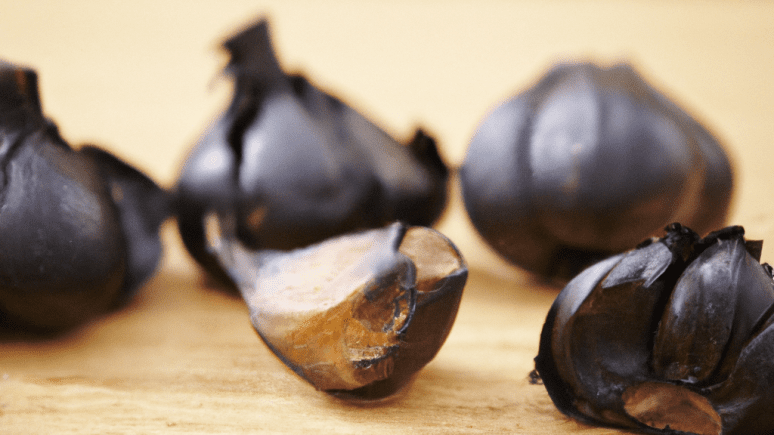What Is Black Garlic?
Black garlic is regular garlic that has been fermented under carefully controlled humidity and temperature conditions for a minimum of several weeks. People in Japan, South Korea, and Thailand have been using black garlic for centuries. However, black garlic has only recently become popular in many other countries in the past few years thanks to its flavor-adding and health-promoting properties.
Black Garlic: Nutritional Information
After fermentation, black garlic contains high levels of polysaccharides, protein, melanoidins, phenolic compounds, reducing sugar, and organic sulfur compounds. These compounds are generally beneficial for the body, providing energy, support to joints, skin, and hair health, and material for tissue health maintenance, antioxidants, and anti-inflammatory molecules.
Nutritional Information* (per serving, 28g):
- Calories: 40
- Fat: 2g
- Saturated Fat: 0g
- Trans Fat: 0g
- Sodium: 160mg
- Carbohydrates: 4g
- fiber: 1g
- sugar: 0g
- Protein: 1g
- Calcium: 20mg
- Iron: 0.4mg
- Vitamin C: 1.2mg
*data may vary depending on different fermentation processes and among companies.
In addition to the listed macronutrients, black garlic contains vitamins (B1, B2, B3, B6, C), folate, iron, zinc, magnesium, calcium, phosphorus, manganese, phytonutrients, and antioxidants.
Health-Promoting Effect of Black Garlic
Studies have shown that consuming fresh garlic has a number of favorable effects on the body. Among them are antimicrobial activity, lowering blood pressure, blood glucose regulation, appetite and digestion improvements, anti-fatigue properties, and anticancer effects. Black garlic has enhanced bioactivity compared to fresh garlic. In addition, black garlic has been shown to stimulate the immune system, assist in the removal of cholesterol to reduce the development of atherosclerosis, lower blood lipids, and promote weight loss. However, more human studies are needed to confirm these findings.
The most prominent characteristic of black garlic is its high antioxidant content. In addition, black garlic contains four to ten times more phenols, plant compounds with antioxidant and other health-promoting properties, compared to fresh garlic. Furthermore, studies have demonstrated that black garlic extract scores high when measuring how well a compound or food can protect against free radical damage.
How to Take Black Garlic
With its sweet and mellow taste and smooth and creamy texture, black garlic can become a delicious addition to your meals. For example, black garlic can enhance the flavor of chicken, fish, risotto, and soups.
The following are some ways you can try to include black garlic in your meals:
- combine it with olive oil to make a salad dressing
- add it to your vinaigrette salad dressing
- use it in sauces and dips
- add it to stews and casseroles
- sprinkle minced black garlic onto grilled meat or fish
- blend it with condiments like mustard and mayo
An alternative way to receive the health benefits of black garlic is by taking black garlic supplements. They are considered safe and don’t have any major side effects. However, as with any other supplement, it is still important to talk to your doctor before taking them. In addition, some people should practice special precautions about the suitability and dosage of black garlic supplements. Such individuals include people on blood thinning medications, pregnant and nursing women, children, people with diabetes or hypotension, and those with an allergy to one or more components of the supplements.
Conclusion
Black garlic is made from fresh garlic fermented under controlled conditions. Through processing, garlic loses its offensive odor while gaining significantly higher levels of beneficial compounds. Specifically, it contains a lot of antioxidants and other molecules with antioxidant properties. You can give it a try by eating black garlic in a whole form or taking black garlic supplements.














Leave a Reply
You must be logged in to post a comment.